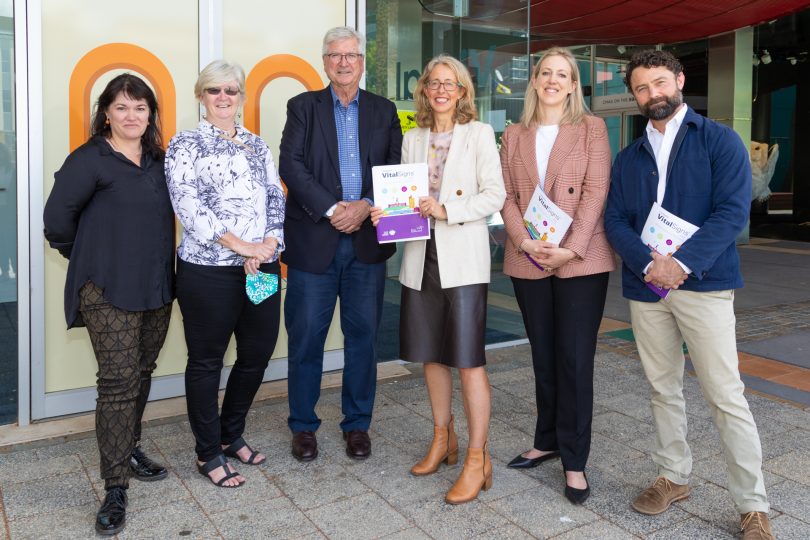
From left: The Snow Foundation’s Carolyn Ludovici and Lesley Daw; Hands Across Canberra CEO Peter Gordon; Snow Foundation CEO Georgina Byron; ACTCOSS CEO Dr Emma Campbell; and Youth Coalition CEO Dr Justin Barker. Photo: Michelle Kroll.
“Everyone in Canberra thinks that everyone else is Canberra is doing fine, but they’re not.” says Peter Gordon, CEO of community foundation Hands Across Canberra.
He’s holding a copy of the second ACT ‘Vital Signs’ report, which is just the 10th such report produced in any Australian jurisdiction.
It’s a collaboration between Hands Across Canberra and the Snow Foundation, a community-led research initiative that explores how we’re doing with regard to healthy education and employment, housing and our sense of belonging.
Many of the indicators are strong: Canberrans as a whole is better educated, healthier and wealthier than anyone else in Australia. We have a strong sense of belonging; the highest trust indicators in the country; the highest voting rates; and the highest rates of informal volunteering and voluntary work.
Canberrans are also more likely to donate to charity than anyone else in Australia.
Vital Signs for Canberra are strong, but report says not everyone in ACT is OK
Canberra is a healthy, wealthy and safe city for most people, but Hands Across Canberra's new 'Vital Signs' report says child poverty, growing housing stress and mental health issues should concern us all.
Posted by The Riotact on Monday, November 8, 2021
But beneath those outstanding wellbeing indicators lies a complex and more difficult picture for others in the ACT. Almost half of all children from single-parent families live in poverty, and social housing need has accelerated into an ongoing crisis that engulfs the working poor – people in full-time employment for who Canberra’s sky-high living costs are totally unmanageable.
Home ownership has decreased as median house prices climb to $1 million, while low-income earners are vulnerable to significant rental stress in one of Australia’s most expensive cities.
Dr Emma Campbell, CEO of ACT Council of Social Service (ACTCOSS), says the ACT’s housing cost pressures are not a surprise.
“We now frequently find ourselves including many full-time workers in the cohort of people we represent,” she says. “The dramatic increases in costs of living mean that many people in full-time work find themselves in rental stress and unable to cover basics such as utilities, food, healthcare, education and transport.”
In total, 38,000 Canberrans live in poverty, many of them children. And up to one-third of Canberrans are vulnerable to financial shocks with limited ability to cope with sudden loss of income or large expenses.
There are disturbing findings about mental health issues in the ACT, too. The percentage of people reporting fair or poor mental health and high rates of distress have climbed, and the ambulance attendance rate for females involving a suicide attempt is the highest in the country. Self-harm rates among youth are also the highest in Australia.
Around 57 per cent of LGBTQIA+ young people reported feeling unsafe and uncomfortable at secondary school due to their sexuality or gender identity.
Youth Coalition CEO Dr Justin Barker says all these numbers are shockingly high in a jurisdiction that’s generally progressive and inclusive. However, he says COVID-19 hasn’t helped, preventing access to education, jobs and social activities.
While the large majority of locals welcome cultural diversity and are proud of our First Nations heritage, many Aboriginal and Torres Strait Islander people reported high levels of mental or behavioural issues. Thirty per cent of children in care are Aboriginal – the third-highest rate in Australia – and while overall adult imprisonment rates are low, 50 per cent of female prisoners and 25 per cent of male prisoners are Aboriginal or Torres Strait Islanders.
Snow Foundation CEO Georgina Byron says the report, which was also hand-delivered to ACT Chief Minister Andrew Barr and members of the ACT Legislative Assembly on the morning of Monday, 8 November, should be used as an active resource for decision makers across the ACT.
“This is a very important report for our local region,” she says. “It provides researchers, policy makers and service providers with guidance on what we should be focused on to make this city and region a place for everyone.
“It helps us recognise the areas we should be proud of while also highlighting those we must work on.”
Your can view the full ‘Vital Signs’ report from Hands Across Canberra and the Snow Foundation here.
Original Article published by Genevieve Jacobs on The RiotACT.



